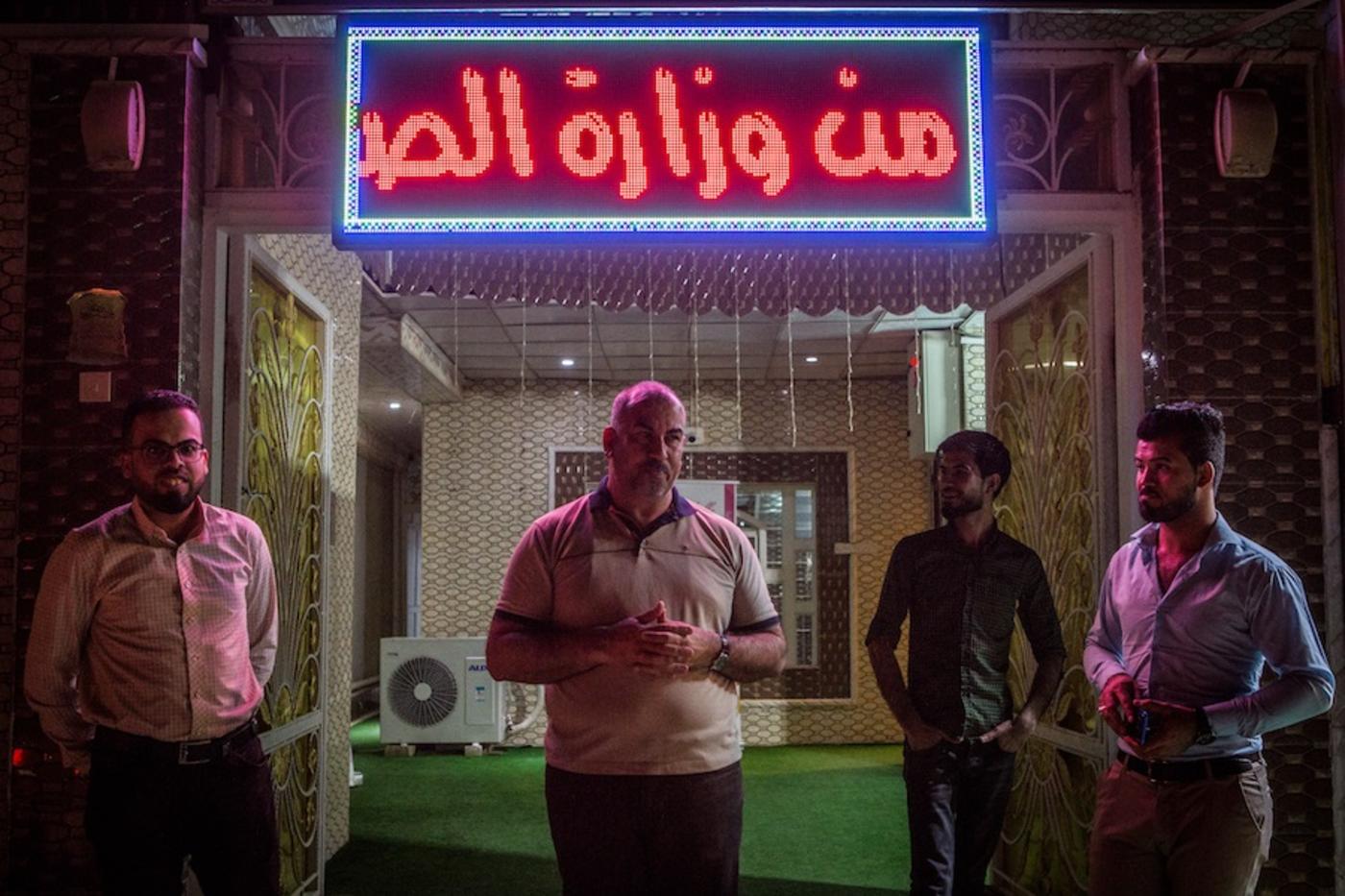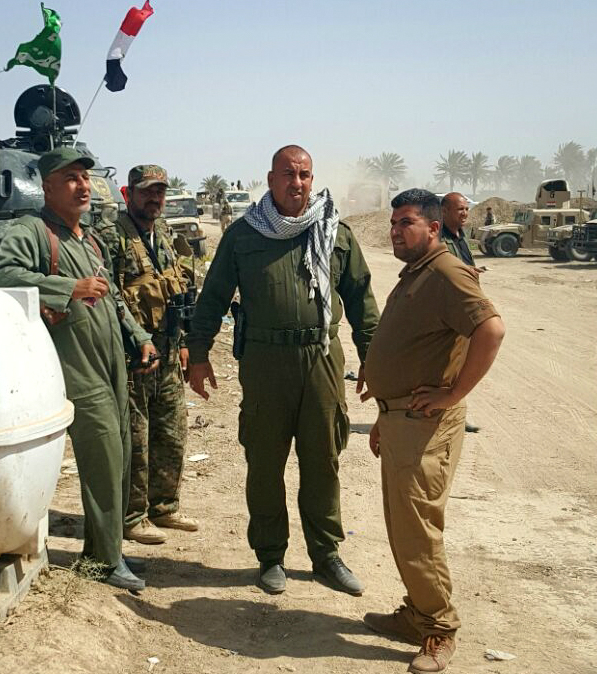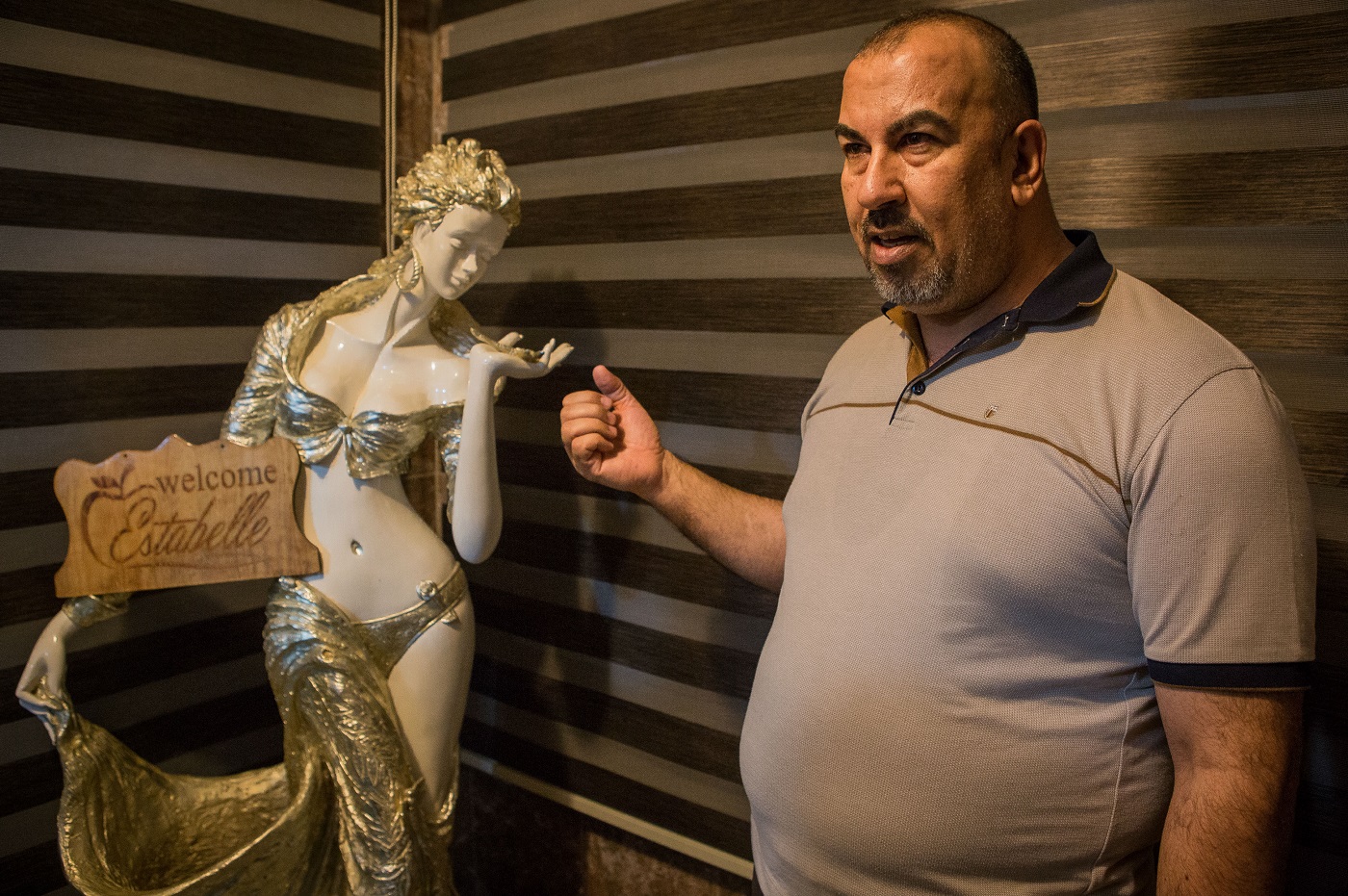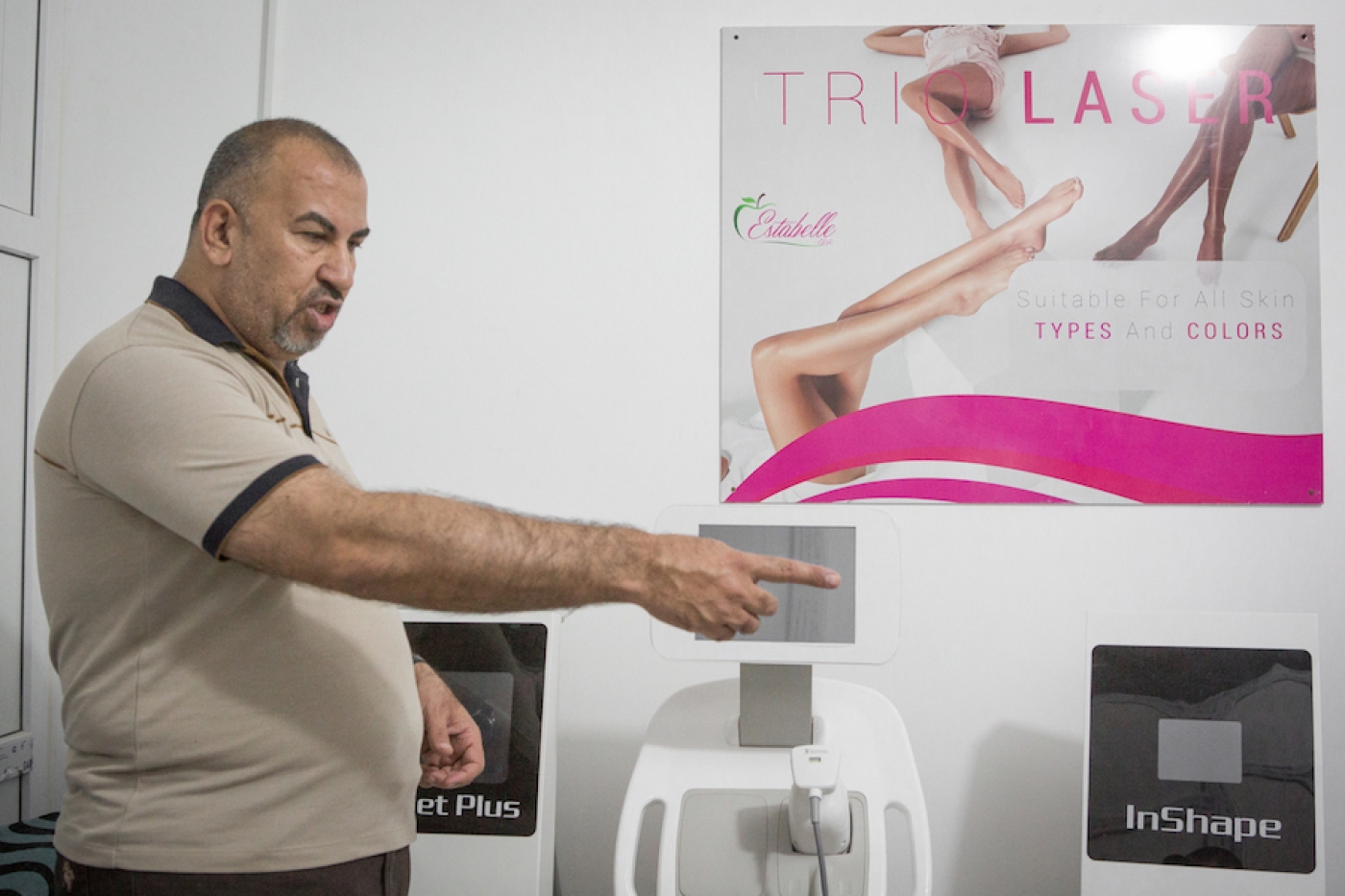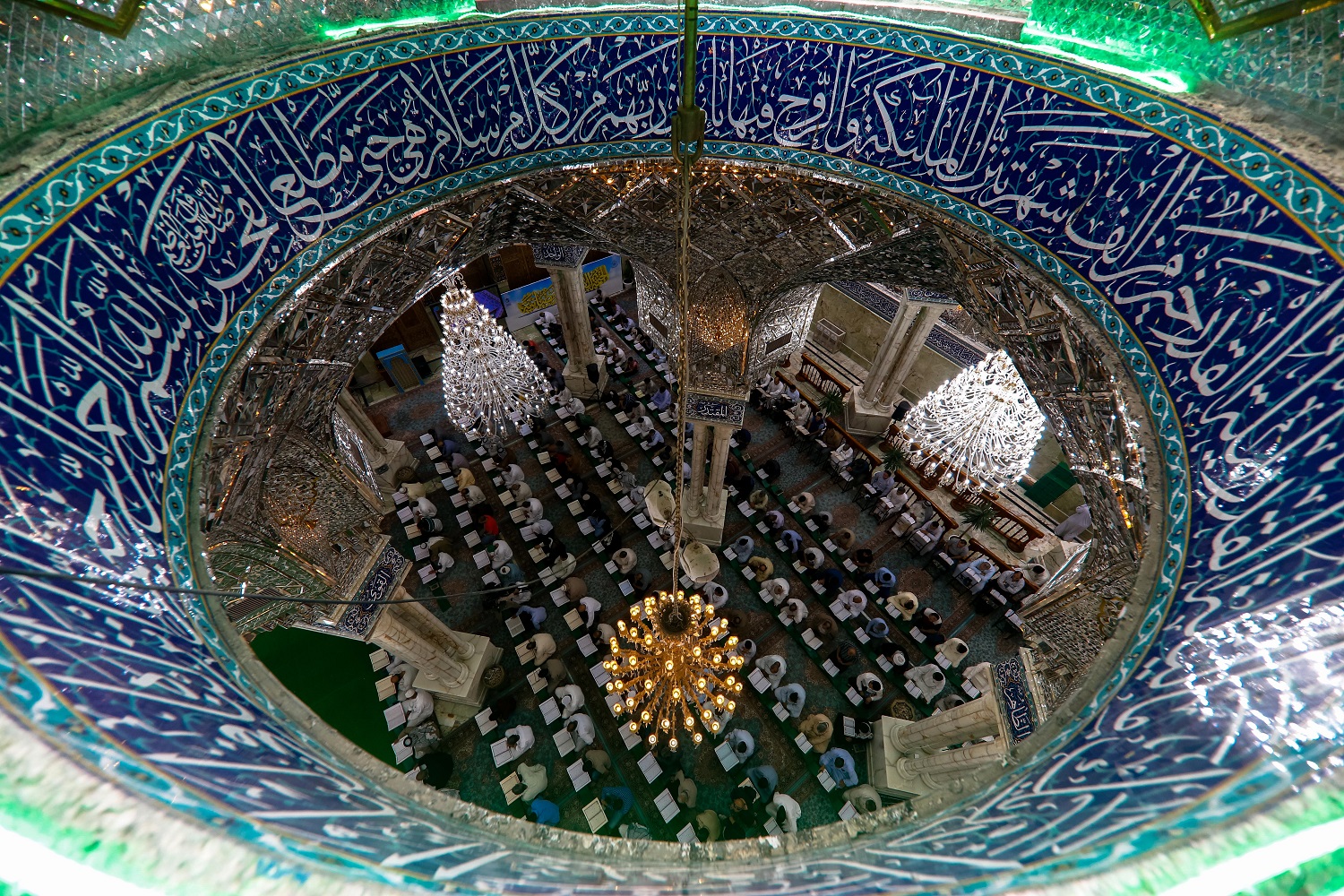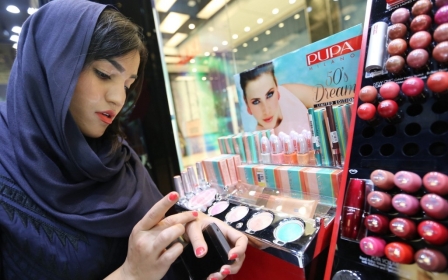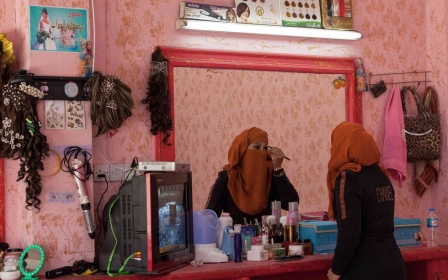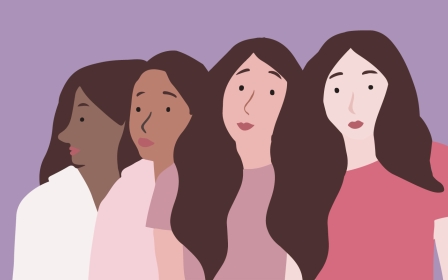I put down my rifle and opened a botox clinic in a holy city
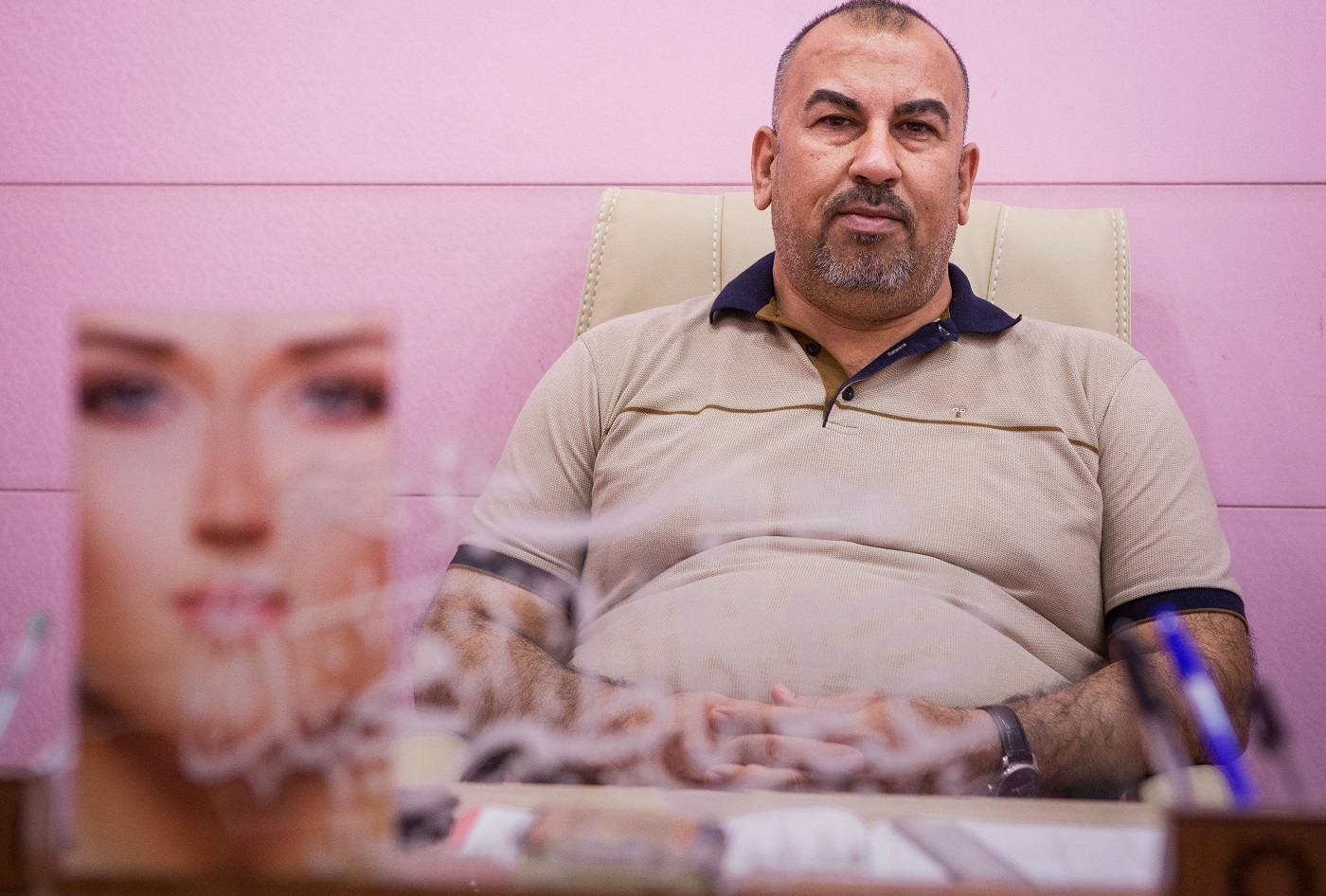
A red LED panel flashes amid the nightscape of Najaf, one of Shia Islam's holiest cities. Underneath stands a man, around six-and-a-half feet tall and looking like a legionnaire.
Behind his massive blunt head is a poster promoting laser hair removal. “Suitable for all skin types and colours,” it reads.
Abbas al-Jabiri, 48, fought against Islamic State for three years. Now he is back in civilian life and forging a fresh career – as a beauty salon owner.
Jabiri opened Estabelle, which he says is the first centre of its kind, in an upscale neighbourhood in January 2018. There’s full body laser hair removal. Liposuction. Botox injections. Cosmetic surgery. Hair and skin care.
New MEE newsletter: Jerusalem Dispatch
Sign up to get the latest insights and analysis on Israel-Palestine, alongside Turkey Unpacked and other MEE newsletters
“I had this idea of founding Estabelle while being on the front line,” he recalls. “When you experience the worst moments of your life, there remains a little space in your mind for hope.”
The call to arms
June 2014: Islamic State seize a third of Iraq. Ayatollah Ali al-Sistani, the country's most influential Shia cleric, calls on Iraqis in the south to take up arms to protect the state.
Dozens of militia register under the umbrella of Hashd al-Shaabi, including the Kata’ib Malik Ashtar, founded by Jabiri and other volunteers
“I was a businessman developing [food] franchises in central and southern Iraq, but the fall of Mosul made me feel like I could not trust the Iraqi army to protect the holiest sites in Shia Islam,” he recalls.
“God asked me to maintain peace among humans on earth, so I decided to shut my business down and join the militia to help to stop this bloodbath.”
Jabiri's unit first deployed across the rocky desert on the outskirts of Najaf, then moved up through Kerbala and the provinces of Anbar and Baiji to cut Islamic State’s supply lines.
“No day was like another and living conditions were tough,” he says. “During the summer months, we all suffered from the boiling heat.
“But whenever there was a fight against Islamic State, I was there, next to my comrades in arms. It would have been inappropriate to send them under fire and stay behind drinking tea."
He recalls how the militia set up networks of spies to raid the opposition, which left 40 fighters dead. Overall, 8,000 of the 120,000 Hashd members died in three years.
“The war against the Islamic State shouldn’t be called a jihad. Rather we refer to it as a fight to save Iraq.” Behind him stands a shiny gold statue of a woman, greeting visitors to Estabelle.
The fresh start
In December 2017, Iraq declared victory over Islamic State. Jabiri felt that his mission had come to an end. He wanted to de-mobilise for another reason, fearing his reputation would be sullied as anti-IS militia across Iraq were accused of carrying out reprisals and criminal activity.
Amnesty International reported that Hashd al-Shaabi fighters carried out war crimes and revenge attacks, including unlawful killings and torture. Many have gone unpunished due to the impunity of Iraqi security forces.
Al Jabiri is adamant – he has always respected the laws of war. “Islamic State fighters perpetrated gruesome crimes in the name of an ideology. Personally, I don’t have any [ideology], all I care about is humanity,” he says.
Jabiri and his property agent first came across the building which was to become Estabelle in late 2017, on what he describes as a “calm and peaceful” street in Najaf.
It took effort get the business off the ground: aside from converting the former 500-square metre family home into a clinic, Jabiri also had to negotiate Iraq’s labyrinthine bureaucracy (the World Bank ranks the country 168 out of 190 countries for ease of doing business), including a much sought-after health ministry licence to carry out medical procedures.
“When Estabelle first opened its doors, I experienced a great sense of personal satisfaction as my dream came true,” he says, “to bring a touch of beauty to everyone’s life in Najaf, and help others getting rid of the psychological pressure accumulated over the years.”
At the start the clinic took no more than 20 customers a day: now, Jabiri says, it only takes pre-bookings and caters to up to 50 clients daily across its 20 treatment rooms.
The inside of the clinic is a world away from the dust and noise of battle. There is near silence as nurses and beauticians come and go. Common areas have been painted in vibrant shades while treatment rooms are all-white. There are no scents: only decorative artefacts on the walls and in the rooms break the medical sterility.
“Something else made me proud,” says Jabiri. “Estabelle employs Iraqis and pays them monthly salaries, it helps them to live a decent life." Among that staff of 16 are beauticians, nurses, doctors, fitness experts and receptionists.
His most popular treatments are laser hair removal and Botox injections. Customers in their early-to-mid-20s, such as students, want manicures and hair dressing, he says, women in their 30s and 40s tend to prefer treatment which can reverse the impact of ageing.
How do customers react to his previous occupation?
"Those who know my past as a military commander feel impressed and inspired by this unexpected professional retraining," he says.
A world away from battle
Jabiri spends his time, like salon managers the world over, dealing with the chores of management: developing the business, overseeing employees and networking to promote the clinic.
He admits that swapping bullets for botox is something of a cultural swerve but adds: “I’m not a military man. I was already a businessman, nothing has changed.
'I’m not a military man. I was already a businessman, nothing has changed'
- Abbas al-Jabiri, beauty salon owner
“During my working day, I always have mixed feelings,” he says. “On the one hand, I feel happy to see our client look more beautiful when they leave Estabelle with a smile. On the other hand, I feel sorry when I hear about my fellow countrymen going through the psychological pain caused by Iraq’s chaos.”
To that end Jabiri has tried to help those who have suffered at the hands of the years of conflict.
“I am reminded of a bride who came to Estabelle. Her dad had been killed during the war against Islamic State and she was about to get married. Unfortunately, she had no money to beautify her physical appearance before her wedding day, and her mother was sick, unable to afford any treatment.
“We decided to take care of her, physically, but we also paid attention to ‘drop seeds of hope’ in her mind to make sure she will feel in love with life. She is now married and happy."
Then there was the young man who had been caught and badly injured in a bomb blast.
“He was unable to afford medical treatment. He had reached the point of being isolated from society and thinking of committing suicide. We connected him to a specialist doctor. Afterwards, we conducted several cosmetic therapies as well as indirect psychological sessions. Today, he is a happy working father.”
Beauty in the holy city
Najaf is a holy city, the third most revered in Shia Islam and the faith’s political focus in Iraq. It's maybe not the most obvious place to open a beauty clinic. But this has not been an issue, Jabiri says.
“Najaf is a tolerant city where inhabitants love life, modernity and look for beauty,” he explains, adding that he has good relations with the religious authorities.
“There is no objection or prohibition as long as we work according to medical standards, in line with Islam and Iraqi social traditions. For instance, we are not allowed to mix women and men in the centre's rooms.
“The Islamic State wanted us to live like the Prophet. But the Iraqi society has changed and I am a forward-looking man who believes that life is about beauty and love.”
This, he says, is the main difference between the group he once fought and himself.
“I truly love beauty and women while Islamic State fighters have unsuccessfully tried to kill humanity, life and happiness in the name of religion.”
“I love my work. I love life.”
Middle East Eye delivers independent and unrivalled coverage and analysis of the Middle East, North Africa and beyond. To learn more about republishing this content and the associated fees, please fill out this form. More about MEE can be found here.


